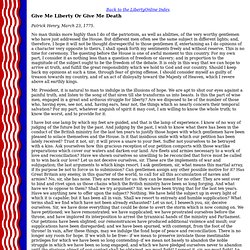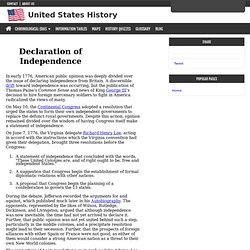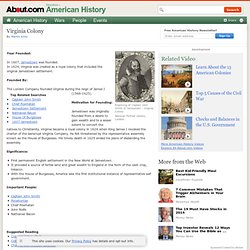

Patrick Henry: Give Me Liberty Or Give Me Death. Give Me Liberty Or Give Me Death Patrick Henry, March 23, 1775.

No man thinks more highly than I do of the patriotism, as well as abilities, of the very worthy gentlemen who have just addressed the House. But different men often see the same subject in different lights; and, therefore, I hope it will not be thought disrespectful to those gentlemen if, entertaining as I do opinions of a character very opposite to theirs, I shall speak forth my sentiments freely and without reserve. This is no time for ceremony. The questing before the House is one of awful moment to this country. Mr. I have but one lamp by which my feet are guided, and that is the lamp of experience. They tell us, sir, that we are weak; unable to cope with so formidable an adversary. The Declaration of Arms. As it appears in the Gentleman's Magazine, London, August, 1775 After the breakout of fighting at Lexington and Concord, and the battle of Bunker Hill — all within recent months — John Dickinson and Thomas Jefferson prepare what will become an historic statement of the colonists' rights.
In their Declaration they hold out the hope of reconciliation with England, but at the same time approve the use of armed resistance to obtain recognition of their rights. While it disavows all claims of independence, it insists Americans will die rather than yield to enslavement. The colonists claim they are fighting a "ministerial" army and not the King.
Their view is that George III has been misled by his counselors. The Americans promise to lay down their arms when their liberties are secured, but also indicate that the colonies may obtain foreign aid against Britain. The Olive Branch Petition - July 5, 1775. We are considering offers for the sale of this website.Use the contact form in the left column to contact us for more information. What is the Olive Branch Petition and how did it come about? Many Americans did not want to break away forever from Great Britain. Many were angry with British policies and treatment, but they thought an agreement could somehow be reached with the King that would right the wrongs done to them. Congress creates the Continental Association — History.com This Day in History — 10/20/1774. On this day in 1774, the First Continental Congress creates the Continental Association, which calls for a complete ban on all trade between America and Great Britain of all goods, wares or merchandise.
The creation of the association was in response to the Coercive Acts—or "Intolerable Acts" as they were known to the colonists--which were established by the British government to restore order in Massachusetts following the Boston Tea Party. The Intolerable Acts were a set of four acts: The first was the Boston Port Act, which closed the port of Boston to all colonists until damages from the Boston Tea Party were paid. The second, the Massachusetts Government Act, gave the British government total control of town meetings, taking all decisions out of the hands of the colonists. Fact Check We strive for accuracy and fairness. But if you see something that doesn't look right, contact us! Ushistory.org. First Continental Congress. The First Continental Congress was a convention of delegates from twelve colonies (Georgia was not present) that met on September 5, 1774, at Carpenters' Hall in Philadelphia, Pennsylvania, early in the American Revolution.
Declaration of Independence. In early 1776, American public opinion was deeply divided over the issue of declaring independence from Britain.

A discernible drift toward independence was occurring, but the publication of Thomas Paine’s Common Sense and news of King George III’s decision to hire foreign mercenary soldiers to fight in America radicalized the views of many. On May 10, the Continental Congress adopted a resolution that urged the states to form their own independent governments to replace the defunct royal governments. Despite this action, opinion remained divided over the wisdom of having Congress itself make a statement of independence. Virginia and the American Revolution. Virginia Colony in Colonial America. Year Founded: In 1607, Jamestown was founded.

In 1624, Virginia was created as a royal colony that included the original Jamestown settlement. Founded By: The London Company founded Virginia during the reign of James I (1566-1625). Motivation for Founding: Jamestown was originally founded from a desire to gain wealth and to a lesser extent to convert the natives to Christianity. Significance: First permanent English settlement in the New World at Jamestown. Important People: Captain John Smith Pocahontas Chief Powhatan John Rolfe Nathaniel Bacon. FREEDOM IS BORN - First and Second Continental Congresses.